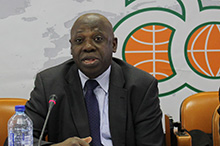Statement by the Secretary General at the 2nd beneficiaries’ meeting of the ACP Cultures+ Programme, 10 February 2015, Brussels

First of all, allow me to thank you for giving me this opportunity to make a few remarks at this meeting for beneficiaries of the ACP Cultures+ programme. This programme has indeed come a long way, and it is gratifying to note the huge interest it has generated not only among artists, but among other development actors as well.
When the ACP Secretariat conceptualised the cultural programme more than a decade ago, no one could have foreseen the positive contribution it has made in the promotion of cultural industries in ACP countries. But beyond that, the cultural programme has helped to lift the profile of the ACP Group in this sector globally.
Due to the reviews received about the film productions produced through ACP Films, some of which have been screened at the Cannes Film Festival, artists and producers and influential people within the global film industry have come to know about the ACP Group.
Cultural aspects of ACP-EU relations were first given a prominent role in the Cotonou Agreement signed in June 2000. Subsequently, the ACP Group organised the first meeting of ACP Ministers of Culture in Dakar, Senegal, in 2003, which made a number of important proposals on how to integrate culture as a development tool within the framework of ACP-EU relations.
During their second meeting held in the Dominican Republic in October 2006, the ACP Ministers of Culture made a commitment to acknowledge and promote the role of cultural networks, and to provide political and financial support to programmes aimed at training and supervising artists, operators, the public and the media. They also agreed to support efforts to integrate culture into school curricula.
Ladies and Gentlemen,
The second pillar of ACP-EC cooperation concerns the promotion of what is often referred to as the participative approaches. The Agreement provides for a greater role of Non-State Actors (NSA), of which cultural actors are an integral part vis-à-vis the designing and implementation of development strategies and programmes.
I therefore wish to take this opportunity to acknowledge and indeed express the gratitude of the ACP Group to the European Commission for its generous financial support for the ACP Culture+ programme.
Ladies and Gentlemen,
Culture generally is what portrays and shapes every facet of the existence of individuals and their communities. The uniqueness and specificities of culture is what makes individuals and communities, more often than not, appreciate the differences among themselves. These differences on the other hand often lead to tension too, because culture is the prism through which we perceive and communicate our perceptions about the world. We often pay a lot of attention to manifestations and expressions of culture, such as song, dance film, painting and sculpture.
However, culture is much more than that. Culture also informs the choices people make about how they wish to lead their lives. And this includes political choices as well, which essentially are choices about development.
The lack of appreciation of the importance of the cultural aspects of development has caused so much misunderstanding and unnecessary tension when policy makers and development practitioners do not sufficiently take these factors into account. It is in this light that culture is recognized by the ACP Group as having a viable role in development and poverty reduction.
Ladies and Gentlemen,
The key challenge for ACP States is exploring ways to utilise their undoubtedly enormous and marketable cultural potential. A plausible reason for the poor economic performance of cultural industries could be lack of targeted policies and relevant pieces of legislation that can promote and support the development and economic exploitation of this important sector.
At ACP level, I wish to reiterate that we have been alert to the concerns of cultural operators and the need to redress the economic underperformance of cultural industries. Through its various iterations, the ACP Cultures+ programme has now become the principle means through which the ACP Group seeks to promote the contribution of ACP cultural industries to enhance opportunities for sustainable development and ultimately poverty reduction in its Member States.
Promoting cultural industries also requires the provision of technical advice and information in order to improve the policy, legal and institutional frameworks of the sector. The theme for this meeting is therefore very appropriate: “best practices and Innovation in the ACP Creative Industries”.
I hope that this meeting will give your good selves and the ACP Secretariat an opportunity to learn and assess the work of the ACP Cultures+ programme thus far and to see whether or not we are on course to meet our stated objectives.
Over and above that however, I think it will also give us an opportunity to learn about some of the practical conceptual issues in relation to the operation of cultural industries, such as, for instance, what we understand by cultural industries and how this notion fits into specific development needs of ACP regions and States.
Your rich experiences should assist in generating answers to some of these practical questions on how to proceed with the rest of our planned actions and programmes in the cultural sector. I thank you for your kind attention and wish you a successful meeting.
Alhaji Muhammad Mumuni
ACP Secretary General
***
